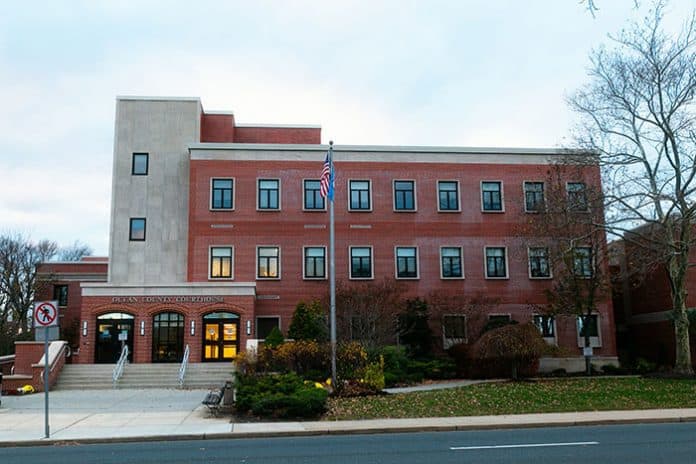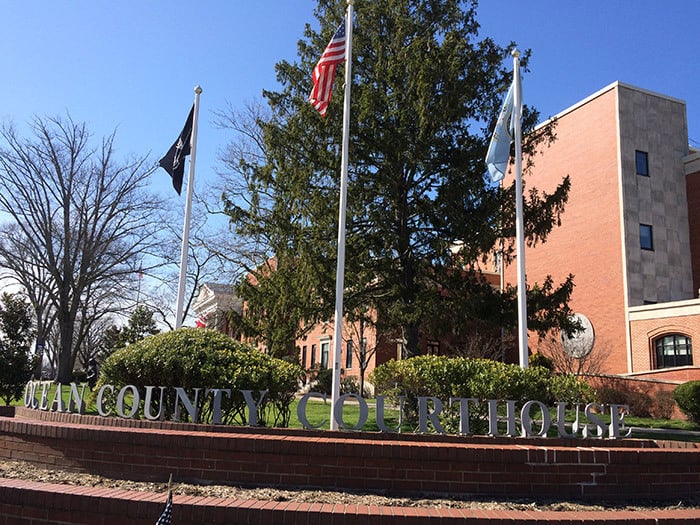
TOMS RIVER – The Ocean County Justice Complex is expanding thanks to an approval by Ocean County officials that will see the enlargement of the facility on Hooper Avenue.
Members of the Ocean County Board of Chosen Freeholders recently reported their intention to award a $3,374,635 contract to Trenton-based Clarke Caton Hintz, an architectural firm, to design what is estimated to be a $50 million project to expand the courthouse.
The Freeholders have said the complex will be expanded northward in an area that is currently occupied by a parking lot, near Toms River High School South.
The entire complex will be re-imagined as well as enlarged. There will be one centrally-located entrance that will see increased security and provide more space for county sheriff’s officers from having to man multiple entrances.
Courtrooms and judges’ chambers will be relocated and cramped elevators might be replaced with large escalators. That plan even promotes social distancing in an age where people are more concerned than ever about personal space and germs.
Freeholder Joseph H. Vicari said some of the reasons why “buildings in New York City and Philadelphia are closed down have to do with elevators. If you look at the new hospitals and sports stadiums, they often have escalators. It’s not only safer for security reasons, but it will allow the building to be occupied at times like these.”
Officials are also looking to create shared spaces that can be adapted to different roles as the way the court system evolves.
Vicari said he feels each judge should “have their own chambers, but the courts are changing.”
Freeholder Jack Kelly said the county is working with the state Administrative Office of the Courts, a state agency, to design the building to the state’s legal standards.
Those standards do not presently allow judges’ chambers to be shared. The court system, however, is in a state of transition – partly because of coronavirus and partly because of new laws such as bail reform.
Kelly noted that “one of the interesting proposals was to have the chambers on a separate floor.” The project has three primary aims: increased security, freeing the county from costly leases and promoting technology and shared working spaces.
Mott MacDonald, an international consulting and engineering firm, previously worked with the county to develop initial guidance for the project.

That firm discovered the county has annual lease agreements in the hundreds of thousands of dollars as well as the upkeep and maintenance of county-owned buildings that are separate from the courthouse.
There are currently 13 different facilities around the downtown area that serve judicial functions. Multiple family courtrooms, drug court, probation services and even a criminal courtroom are located off-premises.
Several million dollars is needed to meet the cost of securing court facilities on an annual basis. There are nine separate security checkpoints due to the scattered nature of the buildings. The consulting firm found that each checkpoint requires the supervision of three county sheriff’s officers whose salary and benefits total around $125,885 per year.
Three offices manning nine checkpoints comes to a total cost of $3,398,895 annually. Under the proposal, building an addition onto the main Justice Complex would remove the need for seven of the nine checkpoints, cutting overall costs, combined with the savings from giving up leased buildings.
Assignment Judge Marlene Lynch Ford informed the Freeholder Board that there have been breaches in the past. She stressed that security concerns were real when the project was first discussed.
Judge Ford noted that judges in some of these out-buildings were accosted by angry litigants on their way out. “What we’re really concerned about is the safety of the people of Ocean County who we service.”
The courthouse has been in need of a renovation and centralization for decades according to Kelly who added he has discussed the subject for the past two decades.
The freeholders are expected to formally award the contract at their next meeting, which will be the last meeting of 2020.
That contract only covers the complex’s design and not it’s construction. Work is currently expected to start sometime in 2023 and finished in 2025. Kelly said funding for the design phase was appropriated last year.







